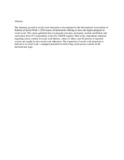| dc.contributor.author | Wairire, Gidraph G | |
| dc.contributor.author | Parada, Henry | |
| dc.contributor.author | Littlechild, Brian | |
| dc.contributor.author | Leung, Patrick | |
| dc.contributor.author | Barretta-Herman, Angeline | |
| dc.date.accessioned | 2015-03-12T07:59:54Z | |
| dc.date.available | 2015-03-12T07:59:54Z | |
| dc.date.issued | 2014 | |
| dc.identifier.citation | Barretta-Herman, Angeline, Patrick Leung, Brian Littlechild, Henry Parada, and Gidraph G. Wairire. "The changing status and growth of social work education worldwide: Process, findings and implications of the IASSW 2010 census." International Social Work (2014): 0020872814547437. | en_US |
| dc.identifier.uri | http://isw.sagepub.com/content/early/2014/10/06/0020872814547437.abstract | |
| dc.identifier.uri | http://hdl.handle.net/11295/81173 | |
| dc.description.abstract | The dramatic growth in social work education is documented in the International Association of Schools of Social Work’s 2010 census of institutions offering at least one degree program in social work. The census gathered data on program structure, personnel, student enrollment and curriculum from 473 respondents in the five IASSW regions. Half of the respondents reported requiring course content in social work history, values or ethics, and 20 percent of required courses are taught by non-social work educators. The expansion of social work programs is indicative of social work’s untapped potential for delivering social justice content on the international stage. | en_US |
| dc.language.iso | en | en_US |
| dc.title | The changing status and growth of social work education worldwide: Process, findings and implications of the IASSW 2010 census | en_US |
| dc.type | Article | en_US |
| dc.type.material | en | en_US |

